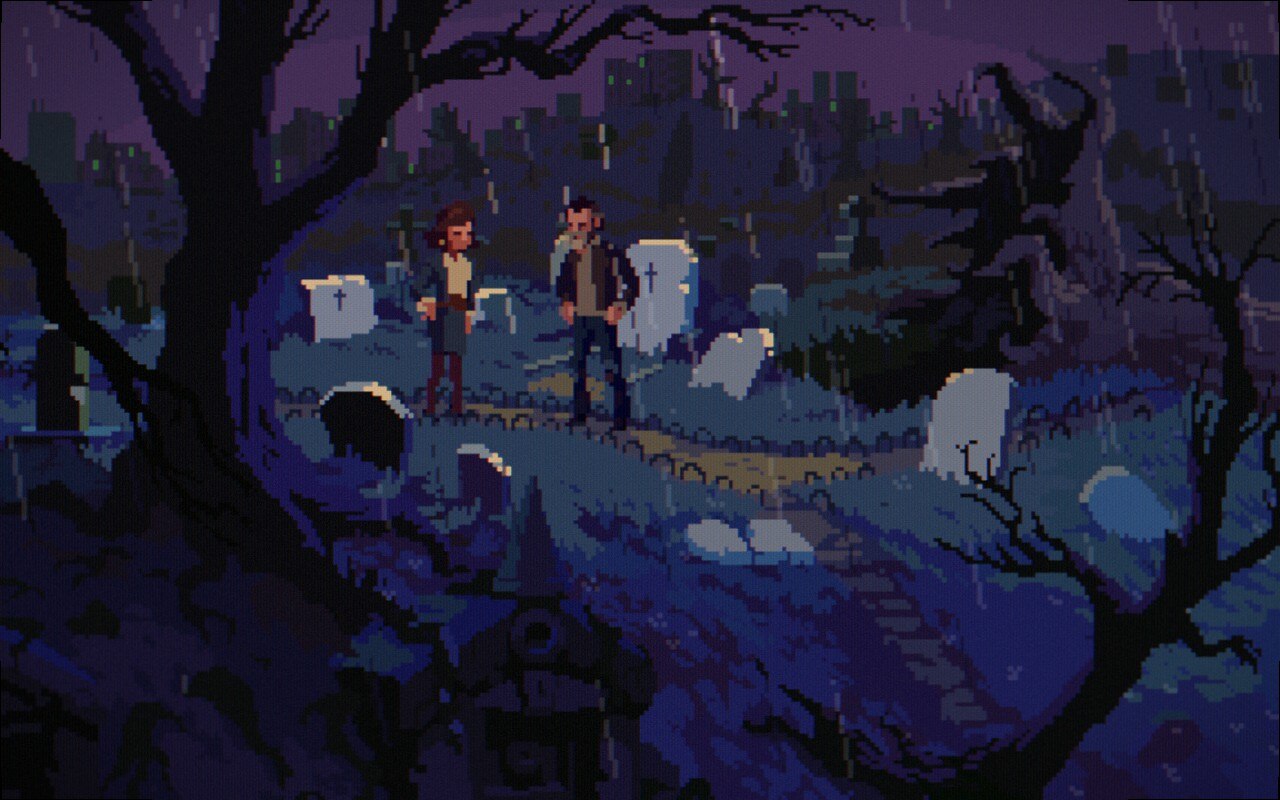The designers of Dishonored, Bioshock 2 and Deus Ex swap stories about making PC's most complex games
We brought together an all-star cast of designers to chat about the past, present, and future of immersive sims. Read, or listen along!

This discussion was originally published in March 2017.
Deus Ex. System Shock 2. Dishonored. Some of the PC's most celebrated games belong to a genre called the immersive sim, which emphasizes creating a complex world with tons of player freedom. They're some of our favorite games to talk about, and at the 2017 Game Developer's Conference we were lucky enough to do just that. We put together a roundtable of familiar faces, all of whom have had a major hand in exploring or creating immersive sims.
Our guests: Warren Spector (Otherside Entertainment), Harvey Smith and Ricardo Bare (Arkane Studios), Tom Francis (Suspicious Developments) and Steve Gaynor (Fullbright).
You can listen to the hour-long audio version of this discussion here or grab it from our podcast feed. Consider putting it on while you play Deus Ex and pretend it's a brand new audio log. Or, if you want the good old fashioned text version, read on.
Wes Fenlon, PC Gamer: Thanks for joining me at GDC to talk about immersive sims, which I would say is PC Gamer's favorite genre. We love 'em. As food for thought, to start with, I want to open up with the idea of talking about why immersive sims are especially important to gaming, whether it's to you personally, as somehow it affected your career or way of thinking about games, as well as the broader industry, guiding what we hope to see from games as a medium.

Warren Spector was a designer on Ultima VI and a producer on Ultima Underworld and System Shock, the forefathers of today's immersive sims. He was also the director on Deus Ex and is currently working on System Shock 3.
Warren Spector: I have a firmly-held belief that to honor a medium, and for it to grow, you have to do what it does that no other media can do. When I look at what games can do that other media can't, I instantly go right to the immersive sim. That sort of real-time you are there, nothing stands between you and belief that you're in an alternate world, that is something that I guess LARPing gets a little close to, and D&D gets pretty darn close to, but we're the first mainstream medium that can actually do that. And the immersive sim is the perfect way to do it.
Steve Gaynor: And I think it's perfectly fair—I think we should start calling them instead of immersive sims, probably digital LARPing. That sounds good to me.
Keep up to date with the most important stories and the best deals, as picked by the PC Gamer team.
Harvey Smith: Let's alienate ourselves as much as possible.
Steve: The interesting thing about this discussion is that there are a couple of us here, me and Tom, who really came to an understanding of immersive sims as fans first, and then got to actually do work in that space. For me, I think it is what you're saying, Warren. Immersive sims are incredibly powerful in that they allow you that full sense of being in another place, not just through visual fidelity or it looks like I'm here, but the systems of the game allow you to express your role within that space in a way that makes you feel like what you're doing is part of it, as well as just being near it, observing, watching.
And that can be anything from: you're a cyber secret agent and here are the things you'd be able to do, and how to express that role when you're in that place. To something that's more subtle, like Thief, where it's not so much about all these wild powers, but what could a Thief do here, what would a Thief do here, and how do we let the player put that on screen.
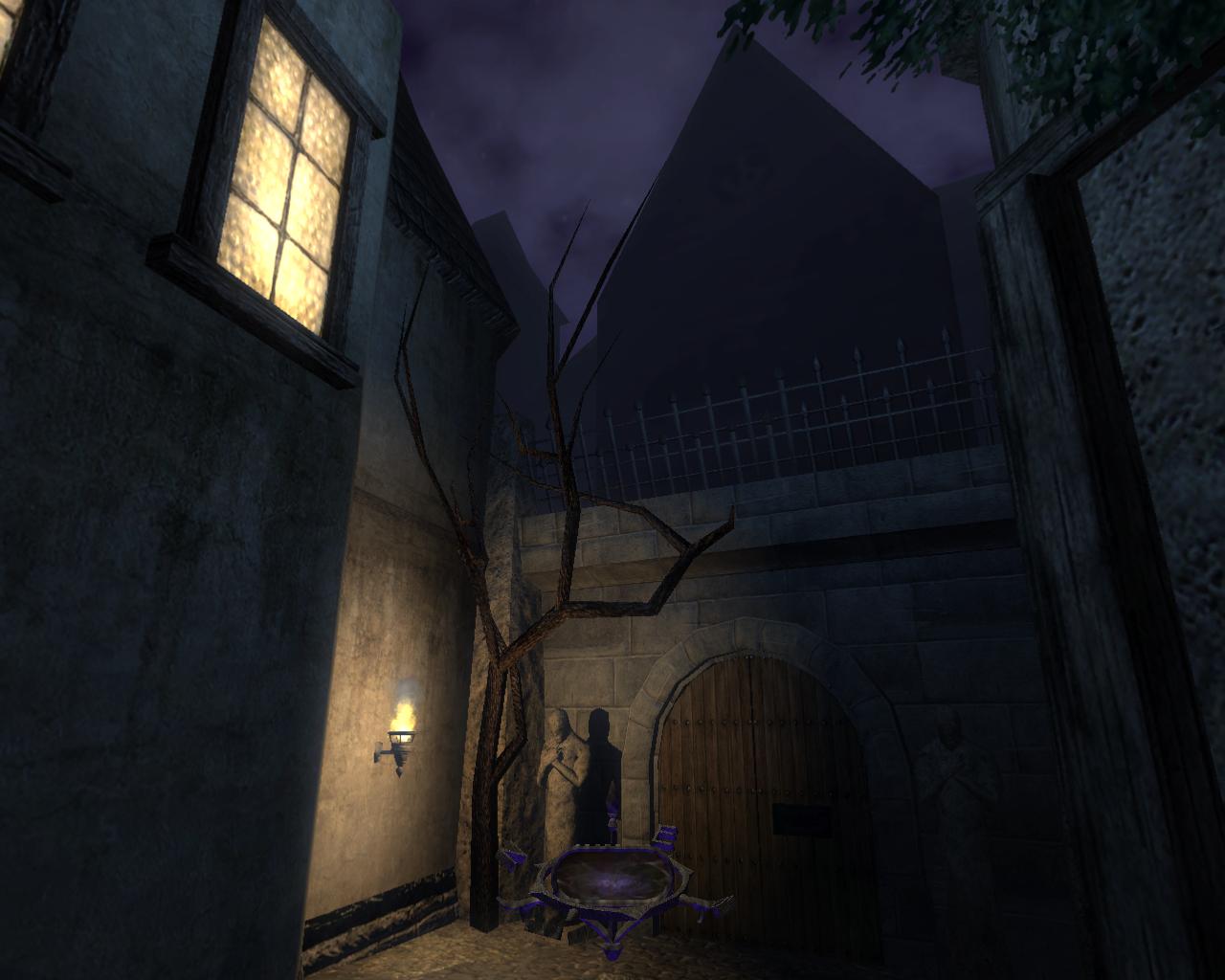
Tom Francis: The immersive part and the sim part are the two parts that you kind of carried over to Gone Home, right? Gone Home was not an emergent combat game, but it was immersive, and it was a sim, and you put a surprising amount of effort into making sure that you could interact with the world around you in a way that would realistically make sense, even though that wasn't core to the story.
Steve: Yeah, there's this feeling I think that immersive sims are about having this consistent ruleset of how the world works and how you work within it. So yeah, if we're making a game about exploring a house, you need to be able to open the cabinets and turn the lights off and on and kind of exist as an intentional agent within that space, even if it isn't about controlling AI to fight each other.

Ricardo Bare was lead designer on Arkane's immersive sim Prey. He previously directed Dishonored's DLC and was a designer on Deus Ex and Deus Ex: Invisible War.
Ricardo Bare: I think it's interesting that Warren brought up Dungeons & Dragons. I've always thought that people who made good Dungeon Masters also often made really good level designers for immersive sims, in particular, because it's this really magical blend of representing the game rules, the RPG system, but also being responsive to the fact that the players around the table are part of the narrative and driving the narrative. Which I think is what happens in a good immersive game. The player feels like a really powerful agent, affecting things, but they're also interacting with a system of rules that are predictable and they can use to make plans.
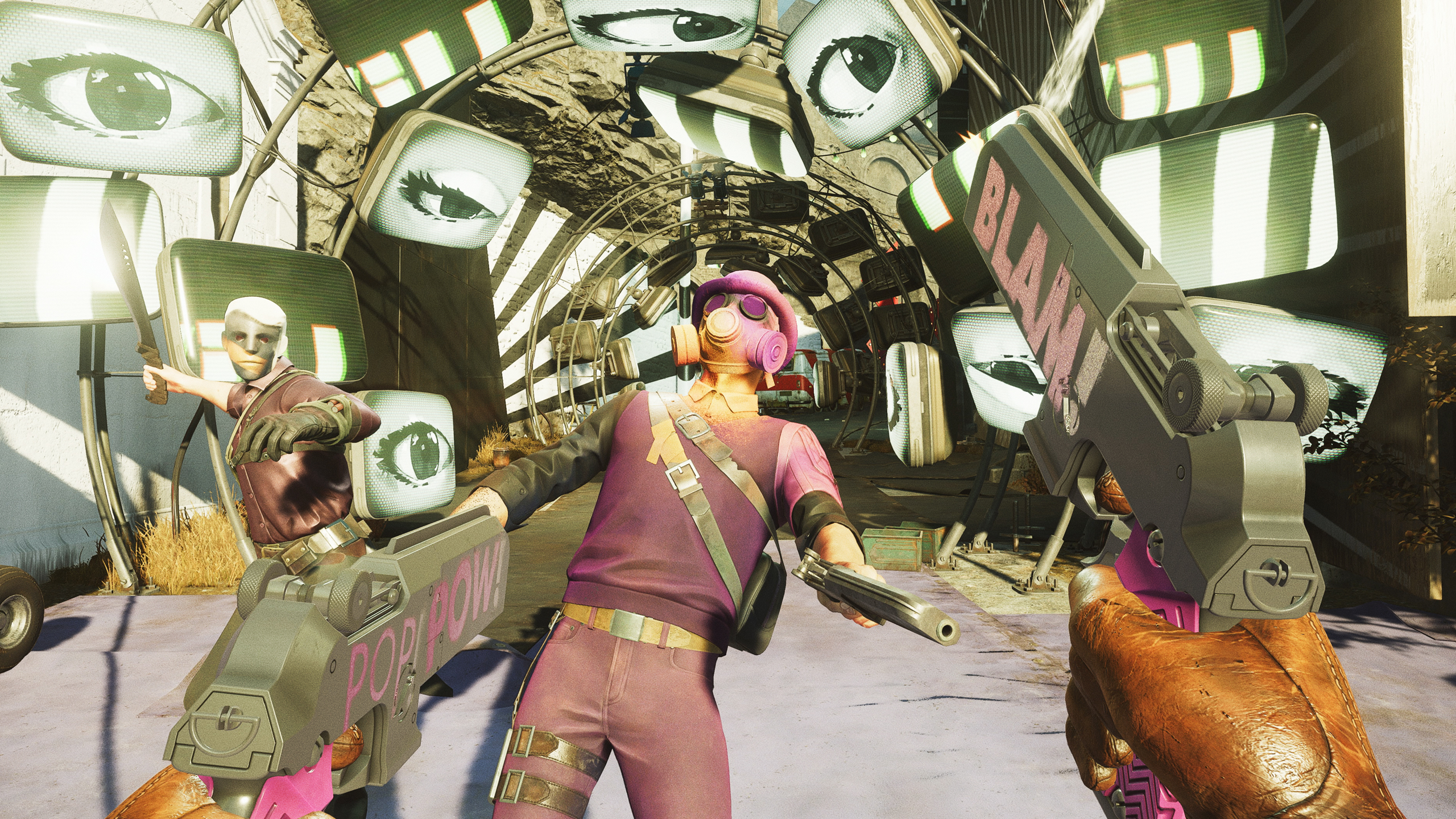
Harvey: I think that you guys have touched upon some of my favorite things about this sub-genre. It's that sense of presence, exploring a place that doesn't just feel like a series of puzzles someone's erected for you, but rather a coherent place that you can actually explore in the real sense of the word. And part of that is the pacing. Immersive sims often go very fast, and very loud, but generally only if you trigger the right sequence of actions. Otherwise they can be very slow-paced.
I think we should start calling them instead of immersive sims, probably digital LARPing.
Steve Gaynor
One of the great pleasures of my current position is not only did we just finish Dishonored 2, the team in Lyon put years of effort into that, but I now roll into playtesting and commenting on Prey, which is the first game in a long time that I find myself, even on the weekends when I'm home, toying with the idea of driving in to play the game. In my mind I'm solving problems, considering rooms and other approaches, and that's a very good sign. I'm in love with the game that Raphael and Ricardo and the team here in Austin have made.
But what I was going to say is the pace is incredibly important to me, and the non-combat verbs. Being able to say 'how can I get into that security station? I don't have hacking. There must be another way. Let me toy around with mimicking a small object and rolling up to the window and going through the little slot that the guard asks for papers through.'
Just solving all those little problems. I look up and it's been 30 minutes, and all I've done is roll around as an object, getting into a small space that I couldn't have gotten into otherwise, noticing some narrative detail. It's the consistency of the rules and the fact that so much is not hand-crafted, but behaves according to system-wide rules that enable this player toy exploration process. The fact that it's in an emotionally evocative backdrop, where you're reading about the lives of people, seeing the traces they've left behind, the mood is powerful, and part of that is that I'm going at my own pace, often just toying around.
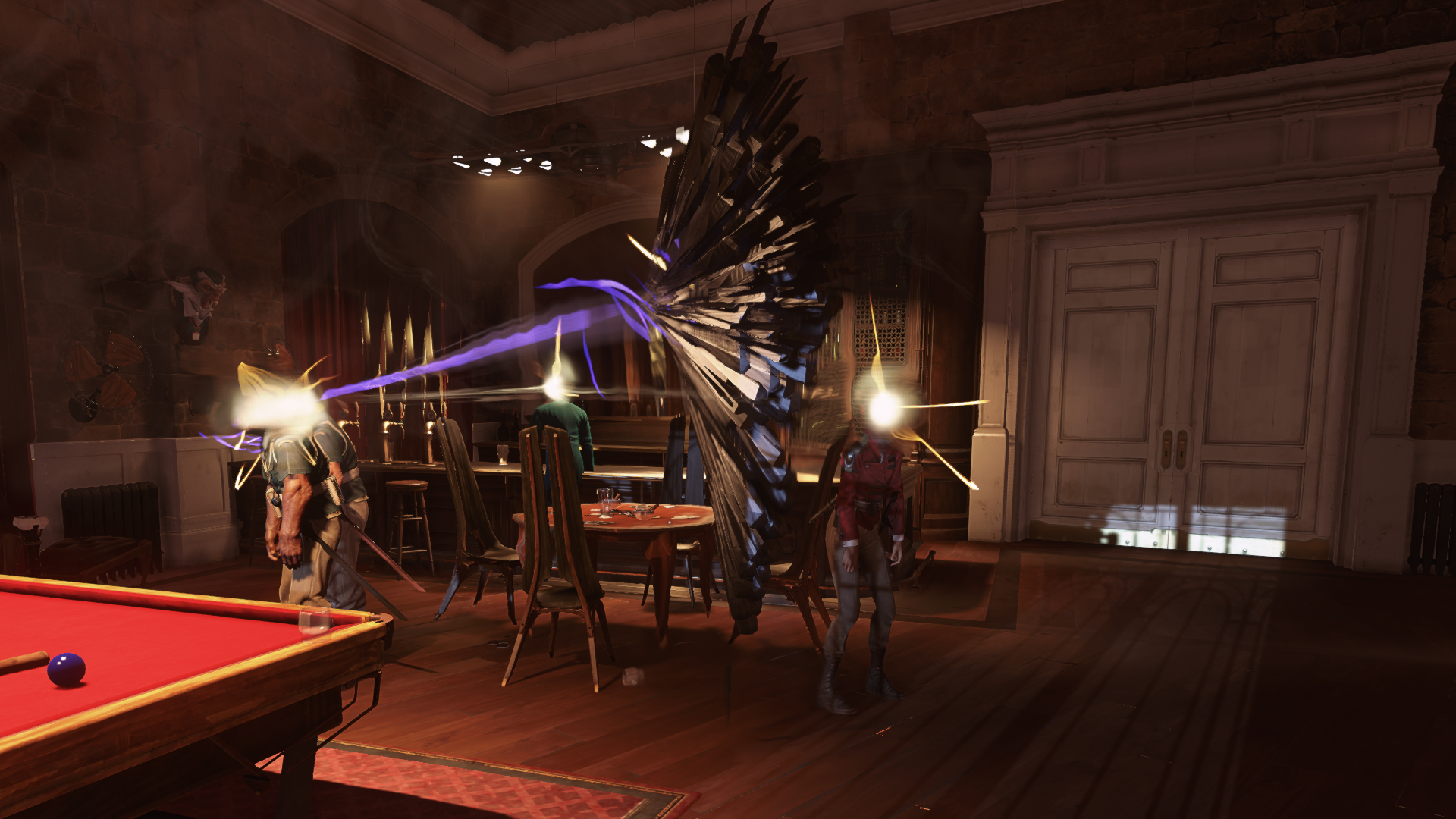
Warren: There are about 10 things I want to say. I know I'm the one who first brought up D&D and then Ricardo brought it up again. One of the most interesting things to me is that though that's a really apt comparison in a lot of ways, in some it's really not. Because one of the defining characteristics of the immersive sim for me is that it's about roleplaying not roll-playing. D&D had its own 'simulation' I guess. Gary Gygax and Dave Arneson were using the best tools they had, which were funny dice.
We have different, and frankly I think more effective, ways of simulating a world. And so there's an interesting discussion to be had about whether die-rolls and characters classes and all that stuff have a place in immersive sims. No, they don't.
But the other thing Harvey brought up, pacing. I'm working on System Shock 3 now, and I've got a team of people who haven't really worked on this kind of game before. One of the things I have to constantly remind people about is that the pacing of these games is very different. It's not run, gun, gogogogogogo. If you do that in an immersive sim and you're really good maybe you can succeed, but when I think about these games, the pacing is more... Okay, I get to a decision point. I stop, I assess. I make a plan. Then it's gogogogogo as I execute. Then it's stop, assess, make a plan. Gogogogogo. So it's this kind of staccato thing that I find really appealing. I love it. Probably because I suck at gogogogogo, but pacing is critically important in these games.

Tom Francis is a former editor of PC Gamer and the developer of Gunpoint and Heat Signature, 2D games which take inspiration from immersive sims. He has written about Deus Ex many times, with great stories like Taking Liberties.
Tom: Something that's come up a lot talking to people about immersive sims lately—Dishonored 2 has kind of kicked it all off again, because all my friends are playing it, and a lot of my friends are Deus Ex fans and have the same taste as me and are loving it. The ones who don't, the common criticism I hear, and it's by no means unique to Dishonored 2, but all immersive sims support multiple playstyles. And most of the ones we're talking about support the very slow, very careful nonlethal ghosting playstyle which Dishonored even sort of marks out as... it doesn't explicitly say it's the best one, but it gives you big check boxes and says 'yep, you did that, yep, you did that' and those are the only two checkboxes, so it kind of seems like the thing you're supposed to do.
A lot of my friends who haven't clicked with these games feel obliged to play that way. Because they know they can, and it's morally better, and the game rewards it in some ways. They feel they can't play any other way. And I know some people don't enjoy playing that way, but just feel compelled to, because they feel like that's how you play these games, and if they screw up they feel like they've got to reload. Maybe there's a challenge there that we haven't solved yet in terms of persuading people to play in their own way and explore new playstyles.
Harvey: Definitely. I think that's less about immersive sims and it's actually inherent to stealth games, in my opinion. Seth Shane is a designer that worked with us on Dishonored 1 and is now lead systems designer on Prey, and funny enough, he and I were talking about that this morning. Where as soon as you have this perception that I could've done that better, I could've done that more elegantly, it does set up for a certain percentage of players, an obsession with redoing it or doing it right. And the whole point of the Dishonored games and the Deus Ex games was there's no right way to play, you can do this your own way, except Tom's right. There's an implicit narrative value judgment there.
But I think it's similar to the problem—there's a community of people who contacted me through Twitter who said 'hey, I know this is weird, but we're a group of people who like to find every coin in the Dishonored games, and we think that there are a few that have fallen through the world that can't be collected. Can you help us?' I was just like, 'Oh my god, I love you guys, but the best way I could help you is to tell you not to collect all the coins.' But they wouldn't accept that, so I did help them. You can get all the coins in Dishonored 2, by the way. But one of the coins was, like, over on a rock to the side of Addermire Institute in the grass, and we had to look for it with the level editing tools to tell them where to go.
Maybe there's a challenge there that we haven't solved yet in terms of persuading people to play in their own way and explore new playstyles.
Tom Francis
In a way, if that's how you enjoy playing the game, and that scratches an itch for you, who am I to say don't do that? But on the other hand, that's definitely not the spirit... I would hope you'd be free to find your own path, and if you want to stand on the roof of the building and look at the bird's nest on top of Addermire with the black bone charm in it and watch the waves rolling in, that's just fine. On the other hand, if you want to go across the objectives, that's fine. If you want to try to ghost the game, that's fine.
But it is weird, how some of these games definitely set up the desire or the obsession in players to do it a certain way. From my personal perspective, I'm only saying this for me, it does feel like that would interfere with the general enjoyment of the game. I don't know. Maybe it's a flaw inherent in systems. Systems driven by computers are basically optimization machines, they're against the true spirit of the word 'play' in that sense.
Steve: I feel like the real sense of joy, when you do play an immersive sim, is the idea that when you're able to let go a little bit and say 'part of what's interesting about this is, if I do screw up and I do get made, there are ways to use my tools to recover.' Even if it's sloppy, even if it's not perfect. If you want to play the perfect ghost run, then that's the goal that you've made. But I think that part of the beauty of these systems, and games like the new Hitman game, or when you play Far Cry 2 or things that are even adjacent to a traditional immersive sim, that feeling of saying 'I'm going to use the rules of the world to scout this area. I'm going to make a plan, and I'm going to attempt it. And then if I didn't notice there was a guy around the corner and he sees me trying to be sneaky, and now I can say, okay, how can I knock him out before he alerts anyone else, or use Far Reach to get up onto that ledge and circle back around' and live within that mistake in a way that can often be much more satisfying.
Rather than saying 'Ah, he saw me, and now I'm going to know where he is for the next time.' But that said, that's sort of a higher-level request of the player than what is actually inside the rules and possibility space of the game itself.'
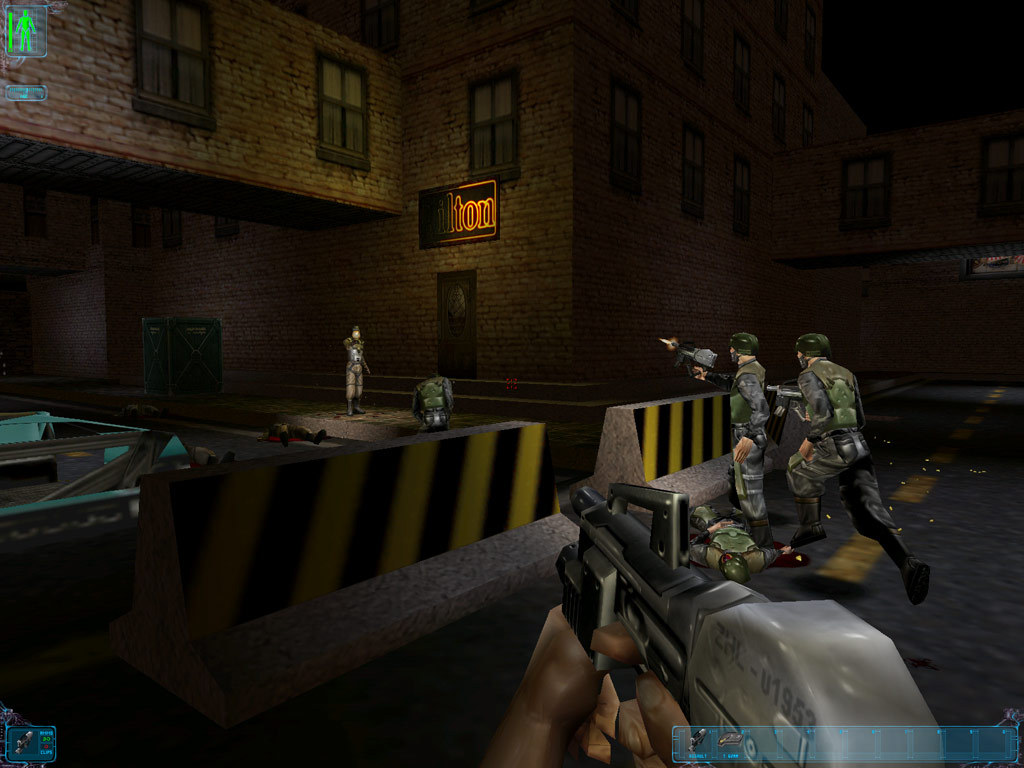
Warren: It's funny, people ask me all the time: 'Do people go out and play extreme playstyles?' Most of the people I hear from play a kind of balanced style. They sneak when it feels right, they fight when it feels right. So I think most people play down the middle and we're talking about the outliers. But the thing that surprised me a lot, that's relevant here: when we were working on Deus Ex I thought players were going to just pick a playstyle and stick with it. 'I like fighting, so I'm going to fight my way through the game.'
Instead, very early on, I remember watching normal humans playing the game, I mean, well, gamers, but I remember watching them play, and they'd get to right on Liberty Island, an early choice point. We tried to reveal the choice points especially early on. They'd get to a choice point and two things would happen. First, they'd put the mouse down and push the keyboard away like 'Oh my god, I have to make a real choice!?' Because games had trained people not to make choices effectively. It's just, okay, kill everything that moves, or I get seen by nothing. And we were trying to do something different.
You don't judge the player. You don't tell the player how to play your game. It's their game.
Warren Spector
I would see that, and then the one that frustrated the hell out of me at first, I would watch people save their game at an obvious choice point, and then try something. And then go back to their save and try something different. And go back to their save and try something different. In one sense that's one of the strengths of the game, that they could try all those things. But then they would pick the one that they liked the best. That was not at all what I thought they were going to do, and it really bugged me for awhile. But then I realized, like you guys were saying, once it's their game, it's their game. As long as they're finding fun, who am I to say how they're playing the game? That's another one of the defining characteristics of an immersive sim. You don't judge the player. You don't tell the player how to play your game. It's their game.
Ricardo: Something that we're all sort of brushing up against, a little bit, that's inherent to the immersive sim, is just the complexity, and difficulty, of onboarding players into a game like that that aren't accustomed to it already.
Harvey: Wow, did you just say onboarding?
Ricardo: Yeah...
Harvey: Oh my god. Go ahead.
Ricardo: Just teaching them, this is a game where there's more than one way to do stuff is really challenging. We've made several games already and we still struggle with how to do that. Warren, you mentioned the beginning of Deus Ex. I remember when I let my brother-in-law play the game. He plays a couple games a year, probably. And when we had the PlayStation version of Deus Ex, I remember handing him the controller, and within 20 seconds he had accidentally thrown his weapons into the water, fell off the dock, and drowned. And I thought, oh my god, we are not making games that are easy for people to get into. At all.
Warren: We are the kings of the cult classic, I know.
Ricardo: Yeah. But it's still difficult.
On the next page, our panel share stories about their favorite moments playing and designing immersive sims.

Wes has been covering games and hardware for more than 10 years, first at tech sites like The Wirecutter and Tested before joining the PC Gamer team in 2014. Wes plays a little bit of everything, but he'll always jump at the chance to cover emulation and Japanese games.
When he's not obsessively optimizing and re-optimizing a tangle of conveyor belts in Satisfactory (it's really becoming a problem), he's probably playing a 20-year-old Final Fantasy or some opaque ASCII roguelike. With a focus on writing and editing features, he seeks out personal stories and in-depth histories from the corners of PC gaming and its niche communities. 50% pizza by volume (deep dish, to be specific).

